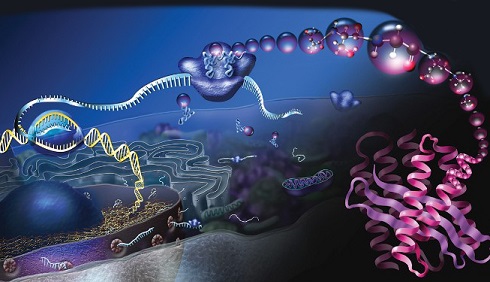Coronaviruses including SARS-CoV-2 use NSP5 protein to target TonEBP and alter host immune defense
Nikhil Prasad Fact checked by:Thailand Medical News Team Sep 26, 2024 1 year, 2 months, 2 weeks, 4 days, 6 hours, 47 minutes ago
Medical News: In a groundbreaking study, researchers from Ulsan National Institute of Science and Technology (UNIST) in South Korea have discovered how coronaviruses manipulate a key human protein to suppress the body’s immune response, ultimately enhancing viral survival and replication. This
Medical News report reveals a major finding in the fight against human coronaviruses (HCoVs), which cause illnesses ranging from the common cold to deadly pandemics like COVID-19.
 Coronaviruses including SARS-CoV-2 use NSP5 protein to target TonEBP and alter host immune defense
Coronaviruses including SARS-CoV-2 use NSP5 protein to target TonEBP and alter host immune defense
The study's findings, showing how coronaviruses deploy the NSP5 protein to cleave a human protein called TonEBP, allowing the virus to suppress immune responses, particularly the production of interferon-beta (IFN-β), an essential part of the body's first line of defense against viral infections.
TonEBP: A Target for Coronavirus
Human coronaviruses, including SARS-CoV-2, have evolved numerous strategies to evade immune detection and suppression. One of these strategies involves targeting host proteins, such as TonEBP (tonicity-responsive enhancer binding protein). Researchers identified TonEBP as a vital component in the immune system’s antiviral response, which was significantly impaired during infection with several coronaviruses.
Coronaviruses carry non-structural protein 5 (NSP5), which cleaves TonEBP into two parts: an N-terminal fragment (TonEBP NT) and a C-terminal fragment. This cleavage significantly reduces TonEBP’s function, particularly its role in promoting the expression of genes involved in immune responses, like IFN-β.
How NSP5 Works
Upon infecting human cells, coronaviruses like SARS-CoV-2 release NSP5, a viral protease essential for the virus's replication and transcription. NSP5 cleaves several host proteins, including TonEBP. The study found that NSP5-mediated cleavage of TonEBP is a common strategy used by multiple coronaviruses, not just SARS-CoV-2.
Using a variety of molecular techniques, the researchers demonstrated that NSP5 cleaves TonEBP at a specific site, which ultimately deactivates its transcriptional role. The cleavage event particularly impacts the function of TonEBP in stimulating TonE-driven transcription, which is crucial in regulating immune responses, especially the production of IFN-β.
In this study, NSP5 was shown to block IFN-β production by preventing key molecules like nuclear factor kappa-light-chain-enhancer of activated B cells (NF-κB) from binding to the IFN-β promoter, thus halting the body's natural antiviral defenses.
TonEBP Cleavage Enhances Viral Replication
An important part of the study was to investigate the consequences of TonEBP cleavage on viral replication. The researchers used a human coronavirus known as HCoV-OC43, which causes mild to severe respiratory illnesses, and infec
ted human cells to track how viral replication is influenced by the cleavage of TonEBP.
Their experiments revealed that the cleavage of TonEBP NT not only prevents the immune system from responding adequately but also directly enhances the virus’s ability to multiply. When the virus cleaves TonEBP, it effectively silences the IFN-β response, which allows the virus to expand and propagate more efficiently within human cells. The study confirmed that the mutant version of TonEBP, which is resistant to cleavage, could prevent the virus from multiplying effectively.
This discovery helps explain why some coronaviruses, especially highly evolved variants of SARS-CoV-2, are so successful at evading the immune system and causing widespread disease.
Study Findings
The research team made several key discoveries:
-NSP5 Cleavage of TonEBP: The viral protease NSP5, produced by various coronaviruses, specifically cleaves TonEBP. This cleavage reduces TonEBP's transcriptional activity, crucial for activating immune response genes such as IFN-β.
-Suppression of IFN-β Production: The cleavage of TonEBP prevents the production of IFN-β, a critical antiviral protein that signals the body to fight off the viral infection. Without sufficient IFN-β, the immune system is severely compromised, allowing viruses to multiply unchecked.
-Enhanced Viral Replication: Cleaved TonEBP fragments, particularly the N-terminal fragment, promote viral replication by disabling the host's immune response. In contrast, cells expressing a version of TonEBP that cannot be cleaved were much more effective at fighting off the viral infection.
-A Universal Coronavirus Strategy: The study showed that this mechanism is not exclusive to SARS-CoV-2 but extends to several human coronaviruses, indicating a shared viral strategy to evade the immune system and enhance viral replication.
Impact and Implications
The findings from this study have far-reaching implications for understanding how coronaviruses, including SARS-CoV-2, manage to cause such severe diseases. By identifying TonEBP as a target of viral NSP5, this research opens the door for developing new therapeutic strategies. For instance, drugs that inhibit the activity of NSP5 could potentially prevent the cleavage of TonEBP, allowing the immune system to mount a stronger antiviral response.
The discovery also sheds light on why some variants of SARS-CoV-2, particularly those with mutations in NSP5, may be more successful in evading immune defenses. This underscores the need for ongoing surveillance of coronavirus mutations and the development of treatments that target not just the spike protein (as current vaccines do) but other viral components, like NSP5.
Conclusions
In conclusion, the study highlights a previously unknown mechanism by which coronaviruses evade the immune system. By targeting and cleaving TonEBP, coronaviruses, including SARS-CoV-2, suppress the production of IFN-β, a critical component of the body's immune response. This allows the virus to replicate more efficiently and may contribute to the severity of illnesses caused by these viruses.
This groundbreaking discovery not only provides new insights into the molecular biology of coronavirus infections but also offers a potential target for developing antiviral therapies. Drugs that inhibit NSP5, or prevent the cleavage of TonEBP, could restore the body’s ability to produce IFN-β and fight off infections more effectively.
The study findings were published in the peer-reviewed journal: Cells.
https://www.mdpi.com/2073-4409/13/19/1614
For the latest COVID-19 News, keep on logging to Thailand
Medical News.
Read Also:
https://www.thailandmedical.news/news/study-find-that-sars-cov-2-proteins-orf3a-and-nsp5-regulate-autophagy-receptor-p62-levels,-decreasing-it-and-leading-to-hyperinflammation-states
https://www.thailandmedical.news/news/sars-cov-2-exploits-a-novel-mechanism-to-induce-apoptosis-in-respiratory-epithelial-cells-via-sud2-and-nsp5-interaction-with-bclii-g-quadruplex
https://www.thailandmedical.news/news/covid-19-news-canadian-study-finds-that-sars-cov-2-nsp5-prevents-and-delays-viral-clearance-by-antagonizing-the-mhc-ii-antigen-presentation-pathway
https://www.thailandmedical.news/news/covid-19-news-canadian-study-finds-that-sars-cov-2-nsp5-prevents-and-delays-viral-clearance-by-antagonizing-the-mhc-ii-antigen-presentation-pathway
